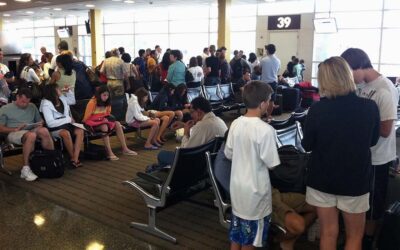
Delayed and canceled flights are happening with greater frequency during this shutdown. This, however, is considered a delay or cancellation beyond the airline’s control. This is especially true if your flight is part of the FAA slowdown to help deal with the ATC slowdown.
Here’s what you have to know about canceled or delayed flights
Canceled and delayed flights can be complicated. But let me simplify them:
- If an airline cancels your flight, it must offer a full refund OR a new flight of the airline’s choosing. It may also owe you some compensation depending on where you’re flying or the reason for the delay. By the way, that’s also true if the airline ends service to a destination, as American Airlines recently did to several cities.
- If an airline delays your flight, your airline owes you less. There’s no requirement that your airline keep its timetable in the United States. For longer delays, though, federal law requires that the airline offer a full refund. If your flight is to or from a destination in Europe, you may be eligible for more compensation.
Fortunately, most cancellations happen with time to spare. Often, travelers learn about their dropped flight weeks before their departure. That gives them plenty of time to contact an advocacy team for help.
Make sure your airline or travel agent has your phone number and email address
Also, sign up for your airline’s text alerts. If your flight gets canceled or delayed, it will try to notify you. We receive a fair number of cases from passengers who didn’t provide the correct email or phone number. They never found out about a cancellation.
Download your airline’s app
The airline’s app will also notify you of any changes. You might also have the option of quickly selecting a replacement flight through the app. That could save you some time waiting in line or on hold. Plus, the app normally has a copy of the contract of carriage or a way to that document.
Check in 24 hours before your flight
That way, your airline knows you are planning to fly. But often, it will also have an update on your flight status. Review your departure time carefully to ensure it aligns with your itinerary. Flight schedules change frequently, but if you have a day to make other arrangements, rescheduling your flight is much easier. You don’t want to arrive at the airport and find out your flight is canceled or delayed. Plus, other passengers who didn’t wait until arriving at the airport now may have snagged the last seat on an alternative flight.
How to prepare for a possible delay
Last-minute delays are as unpredictable as the weather. To avoid getting stuck, you’ll want to pack a few extra items: 
- A fully charged cell phone. A cell phone is a must-have tool during a last-minute delay. You’ll use it to communicate with your airline or online travel agency. Make sure yours is on 100 percent power before heading to the airport. Don’t pack your charger in your checked luggage; you may need it during a delay. Also, consider buying a portable charger in case all the outlets are in use.
- More food. Don’t go to the airport without food. That’s especially true if you’re traveling with kids. You don’t want to get stuck at the airport with only expensive (often unhealthy) food options. (Leave the yogurt and applesauce at home, though. The TSA will confiscate it because it’s a liquid.)
- A change of clothes. Assume you will have to spend the night in an airport hotel or sleeping on a bench without your checked luggage. So pack a change of costume — make that two changes if you’re traveling with young kids. Parents, you know what I’m talking about. Note: If you’re traveling during the winter, and you’re making a stopover, make sure you bring plenty of weather-appropriate clothing. If you’re stuck in a hub city for a day or more, you’ll thank me.
There are several tools that can give you a good idea if a cancellation or delay is coming.
AccuWeather offers a flight weather forecast that will tell you if a delay is likely. Most last-minute flight delays and cancellations are weather-related.
FlightAware allows you to track your flight status and receive alerts if there’s a delay. A basic subscription to its service is free.
FlightStats also allows you to receive information about your flight status. A premium version will also send you flight alerts, plus information about departures and arrivals.
Insider tip: Type your flight number into a Google search bar. Google will retrieve your flight information from OAG and display it, along with some historical flight data.
Your airline probably offers free notifications for passengers. All you have to do is supply your preferred contact method (email, phone, text), and it will do the rest.
Your travel agent or advisor will also keep an eye on cancellations and should notify you quickly if your schedule has changed. A great agent will call you with a recovery plan already in place instead of asking you what you want to do.
What to do if you’re at the airport and your flight is canceled or delayed
First, don’t panic. Stand up and start walking to your airline’s counter.
Open your airline app and look at your flight. You may already see a new departure time or even a new flight. If you’re happy with the rescheduled flight, you can head for the food court instead. Get yourself a cup of coffee and a spy novel, and prepare for a long wait.
If you don’t like the new flight, call the airline immediately as you’re walking to the counter.
Before you get in that long line, consider stopping by a self-service kiosk. Scan your airline ticket. Sometimes, the kiosk can offer new flight options. That’s especially useful when a line extends to the outside of the terminal. Try the kiosk.
Use social media to contact the airline
After that, open another screen on your phone and do one of the following:
- Go to X (formerly Twitter) and send a brief, polite tweet to your airline, mentioning your predicament. You’ll want to follow up with a direct message on the social media platform with your flight information.
- Visit Facebook and send a brief, polite message through its Facebook page. This is just another way of reaching your airline as you wait on hold and wait in a line.
- Send a text message to your airline. Some airlines communicate with passengers via text messages. You can sometimes find out about your flight options in seconds through a few text exchanges.
Pro tip: If there’s a long hold time on the phone, try hanging up and calling your airline’s number in a different country. Sometimes, those agents will be less busy and able to help you. Use WhatsApp to save money.
You’ll want to try everything at once — phone, social media, in-person — to see which one will help you the fastest. Don’t hang up or disconnect from a chat. If an agent gives you choices you don’t like, just try the next option.
Don’t go to the airport if your airline hasn’t given you a confirmed seat on a new flight. There’s no reason to waste your time sitting around if there’s no seat on the plane for you.
For circumstances beyond an airline’s control
If an airline delays your flight because of air traffic, weather, or any other “act of God” event beyond its control, you’re on your own, for the most part. The carrier might offer you a reduced-rate hotel room if you have to spend the night, but it isn’t legally required to do anything.
Why? The airline’s requirements are spelled out in its contract of carriage, the legal agreement between you and the airline. You can find your airline’s contract by searching for “contract of carriage” or “conditions of carriage” online.
In the United States, the contracts do not provide compensation for a delayed flight.
The Department of Transportation also requires airlines to file a customer service plan with the government. It describes what the carrier will do in case of a delay or diversion. It’s not much.
For circumstances within the airline’s control
Many contracts of carriage will provide lodging, meals and ground transportation if the airline is responsible for the delay. Some contracts also provide meals and lodging for extended delays, no matter the reason. The airline’s contract of carriage outlines its obligations.
Remember: If the airline is responsible for the delay, it may have to pay. But there are no federal requirements that it do so. The Department of Transportation only requires that the airline follow its customer commitment and contract of carriage — so take a look at those documents before asking your airline for help.

READ ALSO:
Strategies for shutdowns, and perhaps future ones?
Know these four international air travel rights and save

Christopher Elliott is an author, consumer advocate, and journalist. He founded Elliott Advocacy, a nonprofit organization that helps solve consumer problems. He publishes Elliott Confidential, a travel newsletter, and the Elliott Report, a news site about customer service. If you need help with a consumer problem, you can reach him here or email him at [email protected].



